July 2021: Olive Tree

Volume VI/Issue 4/July 2021


From The Editorial Desk
Those Foundation Issues
There are several companies that specialize in correcting and re -pairing “foundation issues” on your home. You may find their advertisements on the radio where they warn about cracks in your walls, concrete that has settled, windows and doors that won’t open right, etc. They advise that “it is cheaper to fix it than it is to replace it.”Every time I hear one of the commercials, I think of several things the Bible tells us about “our foundations.”
The Foundation, a Question and Its Answers
The question is raised, “If the foundations be destroyed, what can the righteous do?” (Ps. 11:3). In its context it seems to suggest that even the good, godly people are in trouble if the foundations of a society are abolished. In several others passages (Luke11:50; Heb. 4:3; 9:26; Rev. 13:8; 17:8) “the foundation of the world” is noted. In their contexts these references are looking back to the distant past “before,” “since” and “from” the foundations of the world were put in place at Creation. Then we have that great passage which tells us,“According to the grace of God that is given to me, as a wise architect, I have laid the foundation; and another buildeth thereon. But let every man take heed how he buildeth thereupon. For other foundation no man can lay, but that which is laid; which is Christ Jesus.”—I Cor. 3:10,11.Among the teachings here we must acknowledge that getting the foundation of your life, the proper foundation, namely the acceptance of the Lord Jesus Christ as Savior and Lord of your life, is of utmost importance. Finally, we should not forget the great assurance the Lord gives concerning Himself, His truth and His promises to us. Though men may fail us and fall into ‘error’ (II Tim. 2:18), “nevertheless, the foundation of God standeth firm ”(vs. 19).
The Directive to Us Is Quite Clear
Yes, we have very clear instructions from the Lord. Our society may be crashing all about us, but the Lord will not fail us. We can be absolutely secure in all His promised words. Every man has a choice about his foundations. Remember Jesus gave us the story about a man who built “his house upon a rock” (Matt. 7:24, 25) and a second man who built “his house upon the sand” (vss. 26, 27). I sometimes refer to the two men as Rocky and Sandy. Jesus said Rocky was “a wise man” because of the foundation that he chose for his house. He said that Sandy was “a foolish man” because he made a poor choice for the foundation of his house. With both of them, the bad weather came. “The rain descend -ed, and the floods came, and the winds blew.” Rocky did well, but Sandy was homeless after the storm blew through. Is there even a question as to the direction you and I should take? If we give any thought at all to the matter, I believe the right course will be easy to find.
Nothing More Important Than How You Build
If you were building a skyscraper, your architect, your structural engineer and your contractor (not to mention all the bureaucratic inspectors) would demand that you pay attention to the foundations of such a monumental building. But since most of us will never build a skyscraper, what if we build a house, a barn, a garage or even a tool shed? We would be sure one very such project that we had the proper foundation in place. So let’s latch onto the wisdom of God and build like our friend Rocky did. Let’s be wise.
I pray for wisdom and for strength for myself and for each person who reads editorial on this matter of foundations. In these days when the history and heritage of Church are under vicious attack from both outside and from inside, the urgency we face is increasing every single day. If we see cracks in the foundation of our society (that includes our Parishes, our Catholic Schools, Our Family, and the government, etc.), we need all hands on deck to deal with them. We can’t pretend the crisis is some extremist conspiracy that is without merit. We must get the truth of the matter and deal with it.“What can the righteous do?” Well, there is a lot we can do and we should do. Dear friend, we are on the front lines of the battle. Come on, step up, pitch in and let’s go for the victory!

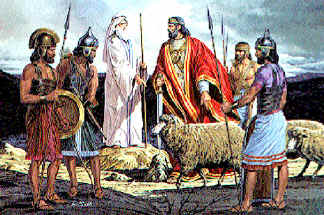
God's Will Is Best
The most insignificant action, performed for God’s sake, is more profitable than the conversion of the whole world, effected from any other motive than the love of God.
In first Kings 15 we read a story of disobedience. "And Samuel said to Saul: The Lord sent me to anoint thee king over his People Israel: now therefore hearken thou unto the voice of the Lord: Thus saith the Lord of hosts: I have reckoned up all that Amalec hath done to Israel: how he opposed them in the way when they came up out of Egypt. Now therefore go, and smite Amalec, and utterly destroy all that he hath: spare him not, nor covet any thing that is his: but slay both man and woman, child and suckling, ox and sheep, camel and ass." (I Kings 15:1-3) (We recommend reading the whole chapter.)
The King performed the slaughter, but not quite as God ordered. God ordered the complete annihilation of the enemy and their flocks. Instead the King kept the choicest of the flock to sacrifice to God. "And Saul and the people spared Agag and the best of the flocks of sheep and of the herds, and the garments and the rams, and all that was beautiful, and would not destroy them: but every thing that was vile and good for nothing, that they destroyed." (I Kings 15:9)
"And Samuel came to Saul, and Saul was offering a holocaust to the Lord out of the choicest of the spoils which he had brought from Amalec." (I Kings 15:12) In verse 22 we read: "And Samuel said: Doth the Lord desire holocausts and victims, and not rather that the voice of the Lord should be obeyed? For obedience is better than sacrifices: and to hearken rather than to offer the fat of rams." The action of preparing a sacrifice is good, but when performed outside of God's will, it becomes an evil.
In our proposition the conversion of the world certainly seems like a great good... and it is. However, an evil intention can pervert the best of things. A small action performed in the will of God is a great good, for the conformity with God's will sanctifies the littlest of actions. As we see in the above story, the King stepped out of God's expressed will and instead decided that his plan was better than God's. He proposed a great good, sacrifice to Almighty God, but outside of God's expressed will.
Have confidence in the Lord with all thy heart, and lean not upon thy own prudence. In all thy ways think on him, and he will direct thy steps.(Proverbs 3:5-6)
I BESEECH you therefore, brethren, by the mercy of God, that you present your bodies a living sacrifice, holy, pleasing unto God, your reasonable service. And be not conformed to this world; but be reformed in the newness of your mind, that you may prove what is the good, and the acceptable, and the perfect will of God. (Romans 12:1-2)
When we go off course, we lose faith in God, considering that in our own prudence, we actually know better than God. Next we show a lack of trust in God. Then we actually place our own will above God's. Isaias writes: "All we like sheep have gone astray, every one hath turned aside into his own way: and the Lord hath laid on him the iniquity of us all." And further: "And meet impudent dogs, they never had enough: the shepherds themselves knew no understanding: all have turned aside into their own way, every one after his own gain, from the first even to the last." (Isaias 56:11)
All of this leads to the main point, we decide we not only know better than God, but also the authorities He has placed over us. We don't trust God, so why would we trust those He has placed in authority. "But his citizens hated him: and they sent an embassage after him, saying: We will not have this man to reign over us." (Luke 19:14)
"Obey your prelates, and be subject to them. For they watch as being to render an account of your souls; that they may do this with joy, and not with grief. For this is not expedient for you." (Hebrews 13:17)
The Church and State both run on obedience. Once obedience is removed, we have anarchy. In the Church, the disobedient will soon find they have left the Church, for if they can judge what should be done in small matters, why not also in matters of Faith and Morals? Obedience is essential to both Church and State. In the Church, all obey the Pope. We also obey the Bishop God has placed over us through the Pope and the Pastor God has placed over us through our Bishop. "Let every soul be subject to higher powers: for there is no power but from God: and those that are, are ordained of God. Therefore he that resisteth the power, resisteth the ordinance of God. And they that resist, purchase to themselves damnation." (Romans 13:1-2)
Saint Ignatius wrote on obedience and obedience should go beyond merely obeying direct commands. We should yield totally to those God has placed in authority over us. We should seek to work with them to ease their burden. We should look for opportunities to be of assistance.
"Be reformed in the newness of your mind" When we are following our own will and our own ideas, we wander far from God. We need to be renewed in our mind and our hearts and come together with God. "Evil thoughts are an abomination to the Lord: and pure words most beautiful shall be confirmed by him." (Proverbs 15:26)
God's will is good, when He sends us tribulations. And accepting the tribulations is better for us than desiring not to have them outside of His will. These are sent for some good reason and we should thank Him for them. In fact, one of the saints says we gain much more grace, when we thank God for tribulations, than when we thank Him for the good things He sends.
Let us remember God's will is always the best thing for us, and even a great good done outside of God's will will not have His blessing. God blesses obedience, not great works undertaken in our own way, rather than His.
Let us remember God's will is always the best things for us.


Wolves in Shepherds Clothing
Yes they may have our Churches, Catholic schools even orphanages but we have the True Catholic Faith. The Vatican now is in Exile. Its like a voice coming from the wilderness calling upon the children of God to repent. " Come out of her, my people".
The good Tree is known by its fruits. The bad Tree is also known by its fruits. What are the fruits of Second
Vatican Council?
1. Destruction of the Holy Mass
2. There's Salvation outside the Catholic Church.
3. False Ecumenism
1. Destruction of the Holy Mass
The Liturgy of the future is leading towards Protestant Liturgy. The 1968 Roman Missal is already protestant as it was authored by six Lutheran Minister with the blessing of Anti-pope Paul VI through Annibale Bugnini. The result : empty Tabernacle. Absence of the real presence of Jesus Christ in the Altar.
2. There's Salvation outside of the Catholic Church.
The absolute religious freedom and relativitizing Catholic Faith is the second fruit of Vatican II. Now a days the teaching that religion is not anymore important propagates. But this is false. In as much as Religion is a relationship. Relationship with God and with our neighbors. How can we be saved if relationship is absent. Moreso, how can we be saved if Christianity is not our religion and Catholic is our church ?Jesus Christ is the Way, the Truth and the Life no one can come to the Father except thru Him ( John 14:6). It follows therefore, that His mystical body, the Catholic Church, is our way to Christ. Not any other religion.
3. False Ecumenism
As written by our Popes in the past, True Ecumenism is Ecumenism of return. Return to the Catholic Church. But now you will never hear this from the Conciliar Church. According to Jorge Bergoglio or Anti-pope francis, "no more proselytizing; proselytizing is wrong " . It turned out that Jesus Christ is only equal to other masters of religion. It turned out that the Catholic Church is only equal to other denomination like evangelical churches. But the truth is the Catholic Church is the True Church of Christ and if one is to be saved, he must return to the Catholic Church.
Obedience without Conviction
The concept of obedience is very familiar to us. We were all supposed to have been taught this at a young age. But yet we need reminders, and succeeding generations will keep arising that need these concepts taught and reinforced.
We start with the basics—what is obedience? It is compliance with an order, request, law, or submission to another’s authority. But the doctrine of obedience or submission is under assault today. Disobedience is one of Satan’s lethal devices against the faithful. It is causing much havoc in society, and homes are floundering and disintegrating, resulting in much trouble and heartache.
Obedience is also the lynch pin of Catholics. You take it out, and the whole foundation of our Christian life crumbles. Any human society, institution, committee, or organization is similarly structured. Remove obedience from a society, and you are left with chaos and anarchy. But the answer is not robotic obedience either. As the title suggests, it is possible to obey mechanically without conviction driving it – but is obedience by itself what we want?
Another question to ask; what is conviction? Conviction is a strong persuasion or belief that is not easily changed.
So obedience without conviction is complying with an order, request, or law without a strong belief that it is necessary. And this does not specifically apply to just one or two areas in our lives but all facets - parish life, home life, personal life, and public life. In other words, to obey even when I don’t “feel” like it, or it doesn’t feel right. Obedience without conviction is a Catholic concept that needs to be taught and lived.
Sadly, we find in our parishes the thinking that I do not need to obey this or that rule because I do not have a conviction for it. This is sometimes expressed in our parishes and homes when we tend to allow some disobedience until the individual gets a vision and a zeal for following Christ in everyday life. We need to give grace and time for growth but, is this not just plain old disobedience? This distinction is becoming misunderstood because of the prevalence of the “man is basically good” doctrine. So, if I am basically, usually, right/good, why do I need to obey someone else’s conviction?
There is a philosophical term for obedience without conviction: heteronomous obedience. It implies laying down my own will and accepting a foreign will or judgment in place of my own. What is the basis for heteronomous obedience? Why do we promote obedience without conviction? Or why obey an external force? In the life of the Christian, this external force is God. The simple answer is we obey God because of our love for Him and His Church. We know that at times He will ask things of us that do not make sense.
An example of this would be Abraham in Genesis 22, where God asked Abraham to offer up his only son Isaac. Did Abraham have the conviction that his son needed to die? Of course not, but he still obeyed because of his love for God.
We could ask another question: what is obedience with conviction? This is not an issue because it is obedience by default. Obedience to my own reason or conviction (autonomous obedience) is not an act of submission but of affirmation. In other words, if you firmly believe something, you will do it. We exercise this daily. Stopping at a stop sign is not just a habit or obeying the law, but is mostly because we have the conviction that we could get hit!
Obedience without conviction strikes at the core of our Christian experience because we believe in a faith that produces results/works. If our faith does not produce obedience, it is dead. Even so, faith, if it hath not works, is dead, being alone (James 2:17).
So why do we struggle with heteronomous obedience? We tend to be feeling-oriented. We like to do things that feel right. True Biblical obedience/submission will not always feel quite right. This is the conflict that Paul graphically portrays in Romans 7.
We have independence issues! We want to take care of our own issues our way! The more independent-minded we are, the more this concept is a struggle. This clashes with Jesus’ words, "Jesus saith unto him, I am the way, the truth, and the life: no man cometh unto the Father, but by me" (John 14:6).
Are we trying to live with a dual allegiance? Two masters at the helm of our life? Jesus said we cannot serve God and mammon. "No man can serve two masters. For either he will hate the one, and love the other: or he will sustain the one, and despise the other. You cannot serve God and money." (Matthew 6:24). This concept is on display when we have members that give a solid personal testimony of Jesus Christ, but their level of compliance to written standards gives evidence to something else. This person seemingly does want both ways at once, but one will win out.
Am I a backslider in heart? The backslider in heart shall be filled with his own ways (Proverbs 14:14). A backslider is weary of the battle, weary of the conflict. He started right but is sliding back to where he started.
An unconverted heart says my way is the only way. I do not want God’s way, and I have no interest in obedience to an external force. I want to do what feels good to me. A rebellious life stems from an unconverted disobedient heart.
Failure to teach obedience in the home. Home is where a child learns that they must obey boundaries and structure put in place by their parents, or there are consequences. A young child of 2-3 years old does not need or cannot have conviction about right and wrong. What is right and what is wrong is often taught without much explanation. Of course, older children and especially teens need much explanation, which builds conviction, especially if they see it lived out in their parents’ lives. But even with older teens, there are times when obedience needs to be enforced even if they do not have a personal conviction for it. If this does not happen, they will struggle, and parents will struggle with obedience to things and situations that call for submission against their will.
The Bible records many examples of obedience without conviction. Hebrews 11 is known as the faith chapter. It should also be known as the obedience chapter. If you take obedience out and leave faith in – you have nothing left.
Noah: Genesis 6-7, and: "By faith Noe, having received an answer concerning those things which as yet were not seen, moved with fear, framed the ark for the saving of his house, by the which he condemned the world; and was instituted heir of the justice which is by faith." (Hebrews 11:7).
Abraham: By faith he that is called Abraham, obeyed to go out into a place which he was to receive for an inheritance; and he went out, not knowing whither he went. (Hebrews11:8). Also, the account already noted above in Genesis 22 gives us another example in Abraham’s life of obedience without conviction.
Naaman: II Kings 5:10-15 This is the account of Naaman receiving healing because of simple obedience. Did he have the conviction that the muddy Jordan would be instrumental in healing him? No. Sometimes we tell ourselves - it has to be more complicated than just obeying. To just obey is too simple; too much beneath us. Simple obedience here (without conviction) brought healing to a deadly disease, just as simple obedience by faith to God’s commands and opposition to our self-will brings salvation.
Jesus Christ: This is difficult. Did Jesus struggle with obedience? Possibly not in exactly the same way we do, and yet we know that he was tempted in all points as we are. We have the account of his struggle in Matthew 26:39, "And going a little further, he fell upon his face, praying, and saying: My Father, if it be possible, let this chalice pass from me. Nevertheless not as I will, but as thou wilt." Several other passages in the New Testament seem to confirm this struggle. Jesus chose obedience in spite of the struggle, but yet we know that He did also have the conviction that He was doing the Father’s will. "He humbled himself, becoming obedient unto death, even to the death of the cross." (Philippians 2:8). "And whereas indeed he was the Son of God, he learned obedience by the things which he suffered:" (Hebrews 5:8).
How then should the truly obedient live? We live by faith, not by sight. One of the fallacies of modern Christianity is if I totally commit and immerse myself in the love of Christ, I do not need to make conscious choices to obey the Word of God because it becomes automatic. Jesus said in Matthew 7:24; "Every one therefore that heareth these my words, and doth them, shall be likened to a wise man that built his house upon a rock" Also, 1 John 2:3, "And by this we know that we have known him, if we keep his commandments." Our assurance of salvation is wrapped up in this thought of obedience without conviction. The following are some areas where we may need some brushing up.
We need to persevere in teaching and expecting obedience in our homes.
When children are taught to obey even when they do not have the conviction or understanding, in later years, conviction should be established. Our parents have told us: you may not understand now, but someday you will. Our goal is to be obedient with conviction, but to get there; we must at times exercise obedience without conviction.
Obedience within the Church. Am I willing to submit and heteronomously obey the voice of the Church when it interferes with my personal conviction? "In like manner, ye young men, be subject to the ancients. And do you all insinuate humility one to another, for God resisteth the proud, but to the humble he giveth grace." (1Peter 5:5). "In this we have known the charity of God, because he hath laid down his life for us: and we ought to lay down our lives for the brethren." (1John 3:16).
Call disobedience what it is – sin.
"Detractors, hateful to God, contumelious, proud, haughty, inventors of evil things, disobedient to parents, Who, having known the justice of God, did not understand that they who do such things, are worthy of death; and not only they that do them, but they also that consent to them that do them." (Romans 1:30,32). "Men shall be lovers of themselves, covetous, haughty, proud, blasphemers, disobedient to parents, ungrateful, wicked" (2 Timothy 3:2) (signs of the end times- perilous times shall come).
Be respectful.
Respect and obedience go hand in hand. It is hard to have one without the other. Authority figures who demand obedience but are not respectful and considerate when exercising authority lose credibility and influence. "Loving one another with the charity of brotherhood, with honour preventing one another." (Romans 12:10).
It is a requirement to have peace with God and to experience eternity with Him. Romans 6:16-23. We are either servants of sin or of righteousness. We daily choose who we will obey by almost seemingly inconsequential “little” decisions in our lives. We will often face decisions to obey the voice of the Spirit or the voices of sinful pleasure, carnality, acculturation, affluence, and self-righteousness. Sometimes we will not have the inner conviction that what we should choose to obey is what we really want to obey. May God give us the courage to always obey His will whether it feels right or not. "There is a way that seemeth to a man right: and the ends thereof lead to death." (Proverbs 16:25). Oh, the sorrow and heartache of those who never learned obedience and realized too late that God required it! Oh, the joy to hear the words that the obedient will hear – enter thou into the joy of thy Lord!

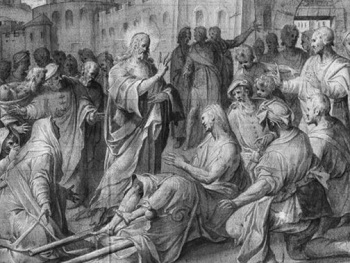
Arise and Walk
And no sooner had our Lord arrived in Capharnaum, as the Gospel tells us, that He was met with a large group of people, and:
[T]hey brought to Him one sick of the palsy lying in a bed. And Jesus, seeing their faith, said to the man sick of the palsy: "Be of good heart, son, thy sins are forgiven thee."
"Jesus, seeing their faith..." Let us see that the faith of those who brought the paralytic was truly pleasing to the Lord, the Lord Who could see what was in their hearts. And, indeed, it was not only the faith of those who brought him, but also the faith of the paralytic man himself. For the paralytic man also undoubtedly believed, as is clear for many reasons, not the least of which is that he chose to leave his house, and put up with being carried through the market-place, and did not shrink away from the real possibility of ridicule or abuse for appearing in the sight of everyone while on his sickbed.
And when he was brought unto the Lord, the Lord said to him, "Son, thy sins are forgiven thee."
The Lord does not immediately proceed to heal the palsy, the exterior illness, the material illness, which was visible exteriorly to everyone. The Lord first heals that which was known to the paralytic man and to the Lord alone, the interior illness; that is, He absolved the sins of the soul.
The Lord here pulls up and discards the root of suffering, sin. Once sin is uprooted, the material sickness can be uprooted also. By forgiveness, the Lord restores the subtle senses of the palsied man; He heals and elevates his injured soul.
Note that the Lord calls the paralytic man “son,” for the Lord grants him the remission of his sins, wherein the adoption of sons is also conferred.
So it is also with us. We cannot call God our Father until we have ourselves been brought before Him, even in our illness, even being exposed before the world, even at the cost of inviting ridicule and abuse, but being brought before Him and hearing His saving words: Be of good heart, thy sins are forgiven thee. Then may we truly call God "Our Father."
The Gospel continues:
And behold some of the scribes said within themselves: "He blasphemeth."
The scribes, typically, were offended and upset. They had seen the Lord driving out disease by His own power, and casting out demons, and commanding the winds and the seas, and doing all these things in a way that no man could do. God alone could perform the works which the Lord had done, this is manifest. Yet, consumed with envy, instead of rejoicing at the wonders of God's grace, these scribes complained, they grumbled, they accuse the Lord here of blasphemy.
And Jesus seeing their thoughts, said: Why do you think evil in your hearts?
Here our Lord without doubt manifests His Divinity, for to know the thoughts of men's hearts is proper to God alone.
Whether is easier, to say, Thy sins are forgiven thee: or to say, Arise, and walk?
Our Lord challenges the scribes by asking which is easier and quicker to do: to say, Thy sins be forgiven thee, or to say, Arise and walk. To effect both of these - remitting of sins and the raising of the paralytic by divine power and the restoration of his strength - is possible for God but impossible for man in his natural power.
But that you may know that the Son of man hath power on earth to forgive sins, then said He to the man sick of palsy, Arise, take up thy bed, and go into thy house. And he arose, and went into his house.
If the Lord's first work here, the remission of sins gave no material, external, visible evidence of itself, the raising of the paralytic by divine power here gives undeniable visible evidence. Our Lord performs a sign as testimony before all. The visible evidence of the one bears witness to the other. That is, the visible evidence, our Lord healing the paralytic man bodily, and him getting up and walking, taking up his bed, going to his house, this gives testimony and witness to our Lord healing the paralytic man spiritually in forgiving his sins. For He Who was able to do the one - the bodily healing - was clearly able do the other - the spiritual healing.
And the multitude seeing it, feared, and glorified God that gave such power to men.
The people marvelled, because the Lord performed a sign as God; nevertheless, they regarded Him as a man, though One with divine power. We know the Lord to be true God and true Man.
Today let us know that there are those of us who also are ill of the palsy, especially a spiritual palsy, having souls which are inactive and unmoved toward good, souls which can do little more than lie upon the bed, having to be carried about by the prayers and efforts of those who care for us and love us.
But if we are taken up by repentance and confession and are brought to Christ, then we too shall hear His sweet and all-powerful voice saying to us: Be of good heart, my son, my daughter, your sins are forgiven you.
Then we will be healed, then we will take up our beds, all of our spiritual and bodily faculties, and go on to do good - not for its own sake, but for the sake of the Lord. Then, when our minds have seen and spiritually understood the many and great works of the Lord for our sake, then do we truly glorify God, Who gave such power to men.

The Funny Pharmacy
A joyful mind maketh age flourishing: a sorrowful spirit drieth up the bones. - Proverbs 17:22

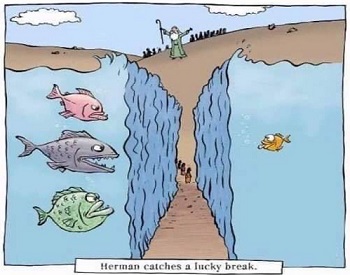




Frequently Asked Questions

Only God can see the heart. Who are we to judge Catholics?
When Jesus talks about judging others, he says, "Judge not, that you may not be judged, For with what judgment you judge, you shall be judged: and with what measure you mete, it shall be measured to you again. And why seest thou the mote that is in thy brother's eye; and seest not the beam that is in thy own eye?" (Matthew 7:1-3)
Jesus then immediately says, "Thou hypocrite, cast out first the beam in thy own eye, and then shalt thou see to cast out the mote out of thy brother's eye." (Matthew 7:5)
So we see here that Jesus is actually not saying to not judge, but instead he is saying to not be hypocritical. He is criticizing those who point out other people's sins, yet sin themselves.
Jesus then immediately says in the next verse, "Give not that which is holy to dogs; neither cast ye your pearls before swine, lest perhaps they trample them under their feet, and turning upon you, they tear you." (Matthew 7:6)
In order to decide who are "dogs" or "pigs" a judgment has to be made. This statement is clearly a metaphor, but nevertheless Jesus is instructing us to make a decision about who is not worthy of what is holy.
Jesus also calls this: "By their fruits you will know them." (Matthew 7:16) He makes this statement is the same chapter, just a few verses later.
Here, in Matthew 7:16, Jesus is talking about false prophets, but again a judgment has to be made. Not only is Jesus NOT saying to not judge, he actually is telling us to judge others based on their actions.
Why? Because our actions reveal the truth about us. Someone can say, "I'm not a killer," but if they kill someone, their actions have proven them wrong. Someone can say, "I'm not a thief," but if they steal, then their actions have proven them wrong. Someone can say, "I have repented," but if they continue in that sin, then they have not repented.
So the idea that we are to "not judge" others is an incorrect teaching.
However, there are two types of judging.
There is objective judgment of "Calling it what it is" and there is subjective judgment of looking down on people and viewing them as less than you because of what they do. Objective judgments are non-sinful, and we see Saint Paul doing it in the Bible as well. However, subjective, arrogant, prideful, belittling judgments are obviously sinful, as the bible repeatedly speaks against arrogance, pride, and belittling others.
Paul on Judging Fellow Believers
Sin is sin. If a believer is committing sin, and they claim to be a Christian, Paul says to not fellowship or socialize with such a person.
"But now I have written to you, not to keep company, if any man that is named a brother, be a fornicator, or covetous, or a server of idols, or a railer, or a drunkard, or an extortioner: with such a one, not so much as to eat." (1 Corinthians 5:11)
Paul even bluntly states that he judges a man who sins, saying, "I indeed, absent in body, but present in spirit, have already judged, as though I were present, him that hath so done, this thing." (1 Corinthians 5:3)
This is appropriate judging. Paul is not being hypocritical by also sinning, and he is objectively calling it what it is: sin.
This kind of judging is exactly what Jesus talks about in Matthew 18, saying, "But if thy brother shall offend against thee, go, and rebuke him between thee and him alone. If he shall hear thee, thou shalt gain thy brother. And if he will not hear thee, take with thee one or two more: that in the mouth of two or three witnesses every word may stand. And if he will not hear them: tell the church. And if he will not hear the church, let him be to thee as the heathen and publican." (Matthew 18:15-17)
Both Jesus and Paul say to refuse those who claim to be Christian, but are sinners as seen by their actions. Why? Paul explains, "Don't be deceived! 'Evil companionships corrupt good morals.'" (1 Corinthians 15:33)
Paul further says, speaking about believers who sin, "Them that sin reprove before all: that the rest also may have fear." (1 Timothy 5:20)
These are the words of Jesus Christ and the Apostle Paul.
For answers to more frequently asked questions, click here: https://www.vaticaninexile.com/frequently_asked_questions.php
The Pope Speaks: July 2021
Living Wage

There is a great evil, that is basically not mentioned, and that is the duty of an employer to pay a living wage. Pope Leo XIII defines a living wage as: "If a workman's wages be sufficient to enable him comfortably to support himself, his wife, and his children, he will find it easy, if he be a sensible man, to practice thrift, and he will not fail, by cutting down expenses, to put by some little savings and thus secure a modest source of income. Nature itself would urge him to this. We have seen that this great labor question cannot be solved save by assuming as a principle that private ownership must be held sacred and inviolable. The law, therefore, should favor ownership, and its policy should be to induce as many as possible of the people to become owners." (Rerum Novarum)
This presumes a family man, who is the sole wage earner with a stay at home wife and children. The median income in Topeka is slightly under $30,000, which the median household income, which would include two worker households is $48,000. The major employers, average in the range of $45,000 per year wage for a worker. In Topeka, for a family of three (the largest they consider), this is over $60,000 per year. As such this is an immoral violation of the principles outlined in Pope Leo's Encyclical.
This problem is nationwide in the United States and is most likely world-wide. With the rich getting richer and the rest of the world getting poorer, there is unrest and calls for many possible solutions. The only true solution to the world's problems is conversion, repentance and prayer. However, We point this out, because We wish to discuss another problem.
Many today are promoting the idea of boycotting certain companies for some of their immorality, such as promoting abortion and other abominable sins. And yet, no one is pointing out that most, if not all, major corporations are participating in the sin of defrauding the laborer of his wages. The Apostle James (5:4) tells us: "Behold the hire of the labourers, who have reaped down your fields, which by fraud has been kept back by you, crieth: and the cry of them hath entered into the ears of the Lord of Sabaoth."
The Church is actually against the idea of boycotting as a means to promote change. Any change that might happen is caused by force and fear, not by a will to depart from their wicked ways. Also those advocating on boycotting are focusing on only a few sins, when Scripture advises us: "From all appearance of evil refrain yourselves." (1 Thessalonians 5:22)
When we purchase products from sinful companies, we do indeed participate in their sin, but this participation is remote participation in the sin of another. Now there are areas where we must not participate in these sins, and one of these is in purchasing stock in the sinful company. This would be direct cooperation in the sin of another. Moralists from almost a century ago compare investing in the stock market to gambling.
If we were to apply the principle of boycotting sinful companies, we would have to apply it to all mortal sins, not just a select few, unless we limited our self to the more egregious sins, such as the sins crying to heaven for vengeance, which includes defrauding the laborer of his wages.
While railing against the more obvious and more modern evils, everyone forgets an evil that has been with us for over a century. If you buy a loaf of bread you participate in this evil. If you buy a gallon of gas, you participate in this evil. Even if you send a donation to this ministry, you are participating in this system. This evil is two fold, central banking and fractional reserve banking.
Let us first consider the central banking system, which was created in the United States in 1913 with the Federal Reserve Act. To make it simple, because economists complicate things in order to hide them. (Read the story of the Emperor's New Clothes.) The central bank creates currency out of nothing, which is fraud. Then they loan it into existence to buy government bonds or to the banks and charge for the use of it, which is usury. There is a fraud that is not considered. Let us say the central bank creates a million rasbutniks for use in their country. This is the only currency permitted to be used as money. They charge the modest sum of one percent a year, compounded yearly, for the use of these rasbutniks. Let us say they take no other action for ten years. There are a million rasbutniks in circulation, but there are 1,104,622 rasbutniks owed back to the central bank. In other words there are over 100,000 more rasbutniks owed than are in existence to repay them. The central bank basically now controls this country, since more is owed than can ever be repaid. Put that into the real world where countries have had central banks for decades, some for over a century, and one can easily see a large problem.
Fractional reserve banking takes currency that is placed on deposit and then puts it aside. They then can loan out ten times as much or so, depending on the reserve requirement and lend it out and charge for the use of it. Let us say they are paying 1% for the use of rasbutniks. Let us say all million rasbutniks from above are deposited at 1% per year. The bank in question can then lend out ten million rasbutniks. Let us say it charges 2% for the use of these. They are paying 10,000 rasbutniks to the depositors. But they are making 200,000 rasbutniks on the loans or a profit of 190,000 rasbutniks.
This may appear simplistic, but it is safe to say that the system currently in place in most of the countries is working on a fraudulent and usurious system, which is objectively immoral.
Why doesn't anyone suggest stepping out and boycotting this system? The first objection will be: "But I will not be able to take care of my family, my affairs, etc." And this is a good reason to remain in for the most part. It will be necessary remote cooperation in the sin of another.
The solution is not boycotting all of the sinful institutions in the world, but in living by the Gospels. Much time and effort is wasted in exposing the evils of the world, which would be better spent in fulfilling our duties, to God, our fellow man and our own self. We have read unfortunate stories of parents, who get so caught up in railing against the evils of the day, that they neglect the spiritual needs of their own children.
However, we should take cognizance of the fact that the world today is so evil, that someone wrote several years ago: "If God does not chastise the world He owes Sodom and Gomorrah an apology." By our own sins, we are asking for chastisement, more so than those in the world who are not as well informed. We are called to a higher level of living. We are called to be saints, and what did the saints do? Let us read their lives and learn from them how to live by the Gospels, because they lived by the Gospels.
In the August, 2018 Olive Tree, we considered the three types of people, spiritual, sensual and carnal. https://www.vaticaninexile.com/august_2018_olive_tree.php Many, who claim to be Catholic are carnal, which is why the Saints are of the opinion that the majority of adult Catholics are lost. Saint John Vianney explains why: "three quarters of those who are Christians labor for nothing but to satisfy this body." And many who do spend some time in reciting prayers are of this lot as Scripture tells us: "This people honoureth me with their lips: but their heart is far from me." [Matthew 15:8]
Yes the evils of today are great. Let us not be part of the evil of today, which many who claim to be concerned Catholics are. Let us become saints, for all are called to such sanctity. Remember, if you are not part of the solution, you are part of the problem.


Saint Mark the Ascetic
On The Spiritual Law

122. If you praise your neighbor to one man and criticize him to another, you are the slave of self-esteem and jealousy. Through praise you try to hide your jealousy, through criticism to appear better than your neighbor.
123. Just as sheep and wolves cannot feed together, so a man cannot receive mercy if he tricks his neighbor.
124. He who secretly mingles his own wishes with spiritual counsel is an adulterer, as the Book of Proverbs indicates (cf. Prov. 6:32-33); and because of his stupidity he suffers pain and dishonor.
125. Just as water and fire cannot be combined, so self-justification and humility exclude one another.
126. He who seeks forgiveness of his sins loves humility, but if he condemns another he seals his own wickedness.
127. Do not leave unobliterated any fault, however small, for it may lead you on to greater sins.
128. If you wish to be saved, welcome words of truth, and never reject criticism uncritically.
129. Words of truth converted the "progeny of vipers" and warned them "to flee from the anger to come." (Matt. 3:7)
130. To accept words of truth is to accept the divine Word; for He says: "He that receives you receives me." (Matt. 10:40)
Saints from East and West
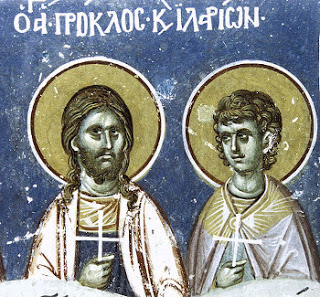
12 July - Saints Proclus and Hilary.
The Holy Martyrs Proclus and Hilary were natives of the village of Kalipta, near Ancyra, and they suffered during the time of a persecution under the emperor Trajan (98-117). Saint Proclus was put under arrest first. Brought before the governor Maximus, he fearlessly confessed his faith in Christ. The governor decided to compel the saint by force to submit himself to the emperor to offer sacrifice to the pagan gods. During the time of tortures, the martyr predicted to Maximus that soon he himself would be compelled to confess Christ as the True God. They forced the martyr to run after the chariot of the governor, heading towards the village Kalipta. Exhausted along the way, Saint Proclus prayed that the Lord would halt the chariot. By the power of God the chariot halted, and no sort of force could move it from the spot. The dignitary sitting in it was as it were petrified and remained unmoving until such time, at the demand of the martyr, that he would sign a statement with a confession of Christ; only after this was the chariot with the governor able to continue on its way.
The humiliated pagan took fierce revenge on Saint Proclus: after many tortures he commanded that he be led out beyond the city, tied to a pillar and executed with arrows. The soldiers, leading saint Proclus to execution, told him to give in and save his life, but the saint said that they should do what they had been ordered.
Along the way to the place of killing, there met them the nephew of Saint Proclus, Hilary, who with tears hugged his martyr-uncle and also confessed himself a Christian. The soldiers seized him, and he was thrown into prison. The holy Martyr Proclus beneath the hail of arrows prayed for his tormentors and with prayer gave up his soul to God.
Saint Hilary, having been brought to trial, with the same fearlessness as Saint Proclus confessed himself a Christian, and after tortures he was sentenced to death. They tied the martyr's hands and dragged him by his feet through the city, wounded and bloody, and then they beheaded him three days after the death of his uncle, the holy Martyr Proclus. Christians buried them together in a single grave.
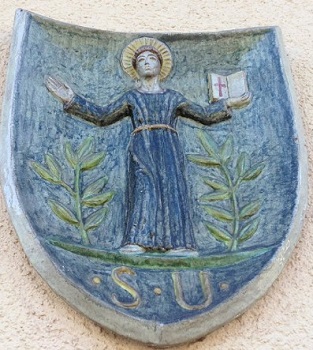
14 July - Saint Ulric of Zell.
Ulric was born at Ratisbon about the year 1020, and went to court, where he was a page to the Empress Agnes. But he had no ambition for a secular career, and after a time was received by his uncle Notker, Bishop of Freising. When he was ordained to the diaconate he was appointed archdeacon and provost of the cathedral. In this office he distinguished himself by the care with which he provided for the proper celebration of divine worship within the cathedral and for the cure of souls without. No one appealed to his charity in vain, and in a time of distress he distributed his fortune lavishly to the sufferers. After going on pilgrimage to Rome and to Jerusalem, finding his office had been given to another, he decided to become a monk. He therefore went to Cluny and there received the habit from Saint Hugh himself in 1052.
Soon after he had been professed and ordained he was appointed chaplain to the nuns at Marcigny, having already been confessor at Cluny. These early responsibilities were the cause of jealousy among some unworthy brethren, to which trial were added violent headaches and no less violent temptations. Ulric bore these with patience and without reproach, but when he lost the use of an eye he resigned his office and returned to Cluny. But his talents were required elsewhere, and he was sent to found a priory on the Rueggersberg and worked with great success for the conversion of sinners in the canton of Bern until he came into collision with the bishop of Lausanne, Burchard, who was supporting the Emperor Henry IV against the Holy See. Thereupon he was recalled to Cluny and ordered to start a new foundation at Grueningen, near Breisach. He found the place unsuitable for a monastery and carried out the work instead at Zell, in the Black Forest. Here he was more fortunate in his bishop, Gebhard of Basle, who appreciated Ulric and seconded him in all his good works. This included the establishment of a monastery of nuns at Bollschweil, near Zell; it was at their prayers that he was enabled miraculously to cure a young girl of cancer.
To advance the monastic life, and the monastic life in all its rigour, was the work of Saint Ulric. When one of his monks found him in tears and asked the reason, he was told, "I weep for my sins. I weep to find myself still not called to the happiness of the heavenly kingdom. But I weep most of all because I see there are several monks here who have only the name and dress of religious." He wrote down in three books the constitutions and customs of the abbey of Cluny, and it was on this recension that his friend Blessed William based the observance of his abbey at Hirschau. Saint Ulric died on July 10, 1093, after having been totally blind for the last two years of his life.

Advice You Can Bank On
A Catholic Perspective On Finances
Why did God allow me to lose my job?
Losing a job is rarely seen as a good thing, especially since financial pressures can cause tremendous tensions in a marriage and family. When someone loses a job, he or she may have a tendency to blame people or circumstances or despise God, but God promises to provide for all our needs through the riches of Christ. (See Philippians 4:19.)
By seriously asking the question “Why did God let this happen?” we can begin to discern how God can bring good out of the situation.
When a husband loses his job, God may want to teach him to:
- Learn to rely on the Lord for provision rather than on an employer.
Scripture affirms that it is God “… that giveth thee strength to get wealth” (Deuteronomy 8:18), not an earthly employer. When God removes an earthly source of income, He is affirming our need to totally depend upon Him.
- Experience the fellowship of receiving “daily bread” rather than monthly paychecks.
The Lord taught us to pray, “Give us this day our daily supersubstantial bread” (Matthew 6:11), not “give us this month our monthly paycheck.” Nevertheless, we have a natural tendency to desire independence and to store up reserves so that we do not need to live from God’s hand to our mouth. God knows that we are closest to Him when we are aware of our daily dependence upon Him. When a person lacks regular employment, he is usually more willing to turn to God to meet his needs.
- Catch up on home repairs.
Most wives know of many household repairs and projects that have needed a husband’s attention for a long time. If a husband is out of work, he can make completions of these tasks a priority. Some of these projects will require money that he may not have. However, that can motivate him to learn how to get the best buy.
- Develop frugality and resourcefulness.
The absence of monthly paychecks is a great motivation to be careful in the way we spend money and to look for ways to be frugal and resourceful. Many services that were formerly regarded as conveniences, such as lawn mowing, car washing, maid service, house painting, and plumbing, can no longer be afforded. These needs present opportunities to work together as a family. Needs that require professional assistance can become opportunities to ask wise questions of professionals and to research ways to do home repairs and maintenance without hiring others to do them.
- Spend more time with your children.
In one well-to-do neighborhood, a father was injured and consequently was unable to work. While he was recuperating at home, he began spending time with his son. Soon, all the children in the neighborhood were envious because this boy had something they did not have: the time and attention of his father.
Many individuals have given testimonies of growing up without much money and cherishing memories of family outings that were free or cost very little. The absence of regular employment provides an ideal opportunity to make special family memories.
- Increase your understanding of your wife and her responsibilities.
When a man leaves home in the morning and is gone through the day, he cannot observe the unexpected interruptions and pressures that a wife may face. When he is home with the family, he can learn to appreciate the load his wife carries and can help her eliminate little hindrances that make her job more difficult.
- Detect character weaknesses in your life.
Evaluate why you lost your job. Did deficiencies in your character cause your boss to form a negative opinion of you or question your value to the company? Being without a job provides an opportunity to concentrate on building character and to demonstrate it first of all in your own family.
- Learn humility and accept assistance from others.
During a time of need, it is not easy to accept gifts from others. A spirit of humility is required to receive their help. This humility opens the door for more of God’s grace. (See James 4:6.)
- Consider the possibility of starting a home business.
The possibilities for establishing businesses that will meet practical needs are unlimited. If you have a mind to work and a love for people, you may be able to initiate a home business. Concentrate on projects that could result in immediate income, and expand as they prove themselves worthy.
One man went to managers of office buildings and worked out a contract to wash the buildings’ windows twice a year. He now has more business than he can handle and is making $80,000 to $100,000 a year.
- Consider the option of relocating.
The loss of your job can encourage you to determine if you are in the right location. Does God want you to move closer to relatives or to live in an environment that would be better suited for raising your children?
- Consider whether you have been faithful to giving.
God promises to open the windows of heaven and pour out a blessing to those who honor Him with all their increase. However, if proper offerings are not given, the devourer snatches away resources. If you have failed to faithfuly give, the loss of a job is a powerful motivation to start giving with any new income that the Lord provides for you.
- Teach your children to look to the Lord.
By their seeing how insecure “job security” is, sons and daughters are forced to realize that we cannot put our trust in companies or uncertain riches, but only in the living God, Who alone is able to meet our needs.
- Draw the family together to fast and pray for specific needs.
God promises that if we fast and pray secretly, He will reward us openly. With the loss of a job, a family has many new opportunities to bring specific needs to the Lord and to trust Him. Through times of fasting and prayer, a family can experience a new closeness with the Lord and with each other.
- Develop compassion for others who have lost their jobs.
Only those who go through the loss of a job can fully understand the pressures and anxieties that occur as a result. As God gives insight and understanding in your situation, you can give comfort to others who have lost their jobs.
- Concentrate on being a spiritual leader in your home.
The most difficult place to live the Christian life is in your own home. Now you can devote more time to carrying out the functions of a spiritual leader, such as reading and memorizing Scripture, asking family members for specific prayer requests, praying, reading biographies of the heroes of the faith with the family, and helping family members study the Scriptures for themselves.
- Cleanse your home of anything that should not be in it.
Evil items are so easily brought into the house. Now that you have more time, carefully evaluate all the things in your home and remove any that have a destructive or negative influence on the family’s spiritual life.
- Clear your home of clutter and sell unneeded items in garage sales.
Now is also the perfect time to clean closets, drawers, the basement, garage, and other places, removing all items that you are not using, and selling as many as possible. Needed items can be put in order.
- Learn to enjoy what God has given.
It is easy to become dissatisfied with the things we have and to look forward to buying bigger and better items that we may not really need. Without a steady income, you can learn to appreciate what you do have and learn to take better care of your possessions so you can enjoy them longer.
- Learn how to suffer need.
Paul explained that he learned how to abound and how to suffer need. When you had a regular income, you abounded. Now, you are learning the disciplines of suffering need. This includes learning to go without and experiencing what Paul talked about when he said, “I count all things to be but loss for the excellent knowledge of Jesus Christ my Lord; for whom I have suffered the loss of all things, and count them but as dung, that I may gain Christ:” (Philippians 3:8).
- Expose the foolishness of buying unnecessary items.
When you have ample funds, it is tempting to spend extra money on status symbols such as certain brand names of clothing or other items that demonstrate that you are part of the “in” group. With this practice, there is additional pressure to compromise standards so as not to be rejected by those we are trying to imitate. With limited funds, the concern is not for vain prestige, but for daily provisions.
Why did God allow you to lose your job? Perhaps He wanted to bless you with unique opportunities to learn to trust Him more fully, to seek Him more diligently, and to love Him more intimately. Ask God to show you the benefits of your suffering … and He will! Our merciful heavenly Father promises to work all things together for good, as He conforms us to the image of His Son. (See Romans 8:28–30.)

 Family Matters
Family Matters
Fearfully And Wonderfully Made
What is a value of a child-just one-just one precious child? Who can measure it? I cannot, for I don't know what God will do with this child. I cannot see into God's heart to know what His plan and purpose is for the child. One thing I can do. I can look into the pages of the Word of God, and find God's heart breathing in it. If we meditate on the value of a child from God's perspective, we see that He has placed a very high value on each one of them.
Psalms 139:13-18
For thou hast possessed my reins: thou hast covered me in my mother's womb.
I will praise thee; for I am fearfully and wonderfully made: marvellous are thy works; and that my soul knoweth right well.
My substance was not hid from thee, when I was made in secret, and curiously wrought in the lowest parts of the earth.
Thine eyes did see my substance, yet being unperfect; and in thy book all my members were written, which in continuance were fashioned, when as yet there was none of them.
How precious also are thy thoughts unto me, O God! how great is the sum of them!
If I should count them, they are more in number than the sand: when I awake, I am still with thee.
These verses take us into the Throne room of heaven, where plans and purposes burst forth from the mind of God. Picture the living God, the God of the whole Universe who rules all things from His throne, forming your child in detail while he is yet in the womb, and planning it all before the foundation of the world. If your child is, in fact, fearfully and wonderfully made by Elohim (God Creator), then He surely has a purpose for him, a holy purpose, one that demands your utmost care and attention.
If we could get a glimpse, prophetically, of what God wants to do through your children, you could begin to see their value and act accordingly. Only God can help us see all this.
Saint Zelie Martin, Saint Therese’s mother was so dedicated to raising her children, even during the hardest times. She was a working mother, running her own lace-making business, all the while gave birth to 9 children (4 of whom died in infancy) and raised them to have strong faith and humility. Saint Zelie is one of the great patron saints for mothers, especially working mothers as well as wives. She was inflamed with a vision of the value of her children. God inspired her to raise a different kind of child. She was moved by the precepts she saw and heard through the scriptures, and by faith she raised them for the glory of God.
What was the value of Abraham and Sarah's little baby boy? They had a prophetic word, and a promise from God, concerning him. Imagine the awesome joy at his miraculous birth. Yet even then, they had no idea about the magnitude of his influence.
Our levels of value vary. When a baby is born from a womb that has been barren a long time. You can see the value of that precious baby in the eyes of the parents as they hold their little on for the first time. They have waited a long time. They behold their gift, their reward from the Lord. With reverence and wonder. It seems that God often witholds a child to raise the level of value in the parents. I have meditated on the examples of barren parents in the Bible. Consider my musings:
-
Abraham and Sarah waited 40 years for Isaac
-
Isaac and Rebekah waited 20 years for Jacob
-
Jacob and Rachel waited 20 years for Jospeh
-
Manoah and his wife waited years for Samson
-
Ruth waited for 12 years before Obed was born.
-
Hanna waited for years before Samuel was born.
-
Zacharias and Elisabeth waited 50 years for John the Baptist
Look at the beauty and wisdom of God in each of these examples. The withholding of children became days of preparation in the hearts of the parents. As the years went by, the value of a child rose higher and higher. In all this, we can see God training the parents to receive a child with reverence. With this high and holy view, the parents train the child for a special purpose in God's kingdom. It is beautiful to behold the wisdom of God working in these parents.
When we consider the New Testament context of God's work, the preaching of the Gospel, the white harvest fields, and the s;shortage of laborers, surely there is a work to do for every one of our children. If God had ten thousand Augustine of Hippos, He would lay His hand upon each one of them and use them to shake a people for His name. However, before he can find all these usable servants, He needs ten thousand parents who will live by faith and raise their children with holy purposes in mind.
We can see this concept of high value even in the natural order of human life. When a king has a son who is going to be the heir of the throne, that king puts priority on the training of his son. He is the son of the king, and everyone assumes that he will get special care in his rearing. What about our children? They are the sons and daughters of the King of kings.


Books to feed your faith!
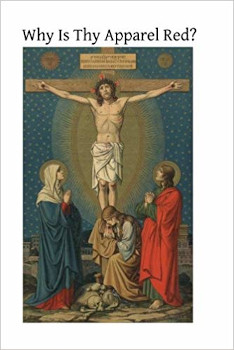
Why Is Thy Apparel Red?: Or the Glories of the Precious Blood
$14.95
Saint Catherine of Siena bids us fill our memory with thoughts of the Precious Blood of Jesus. This the writer has attempted to do in the following pages. Those who thirst for the love of God and for the salvation of souls, yet feel oppressed by the consequences of their sins, and are diffident about the efficacy of their prayers, will find in the devotion to the Blood of our Redeemer a source of consolation and encouragement altogether too little known and appreciated. The Church elevates the chalice every morning at Mass for our adoration and as a propitiation for our sins, and her liturgical prayers are replete with invocations to the Precious Blood, to awaken our confidence in this Blood of the Atonement. "Having therefore, brethren, a confidence in the entering into the holies by the blood of Christ" (Heb. X, 19). Our Eucharistic Lord is glorified in the Blessed Sacrament by the devotion to His Divine Blood, trampled under foot in the Passion, but now acclaimed with joy by us, the chosen people of the New Law, as the Price of our Redemption. IIis Blood be upon us and upon our children for the sanctification of our souls!
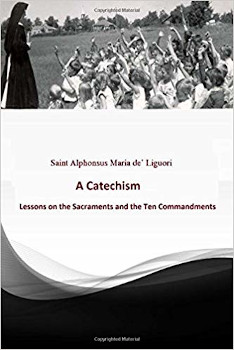
Catechism: Lessons on the Sacraments and the Ten Commandments
$14.95
Dearly beloved Christian, impress well on your mind the mysteries of your holy faith, and the things that are necessary for making your confessions and Communions with fruit. And after having learned them well, repeat them at home and teach them to others. You will thus give great pleasure to Jesus Christ; and with a little trouble you shall share in and gain all the good which, through your instructions, others shall afterwards do. In order to save your soul, it is not enough for you to be made a Christian by the sacrament of Baptism, which you have received; it is, moreover, necessary for you to know the mysteries of faith, to observe the commandments of God and the Church, and to receive the holy Sacraments with the requisite dispositions. First, you must believe that there is one only God, and that He is omnipotent; that is, that He has created the heavens, the earth, the angels, men, yourself, and all things. God is immense; that is, He is in heaven, on earth, and in all places. God is just; He punishes sinners, and rewards the good; He sends to hell all who die in mortal sin, and gives the glory of heaven to them who die in His grace. You must believe in the most holy Trinity; that is, that in this infinite, eternal, omnipotent, immense, and just God, there are three divine persons, who are called Father, Son, and Holy Ghost; three persons, and only one God. You must believe that the Son of God, that is, the second person of the most holy Trinity, was made man in the most chaste womb of the Virgin Mary by the operation of the Holy Ghost; that He was born an infant, in a stable, and that He died on a cross in order to save our souls; and that He is called Jesus Christ, true God and true man; that, after death, He arose again the third day from the dead, that He ascended into heaven, and sits at the right hand of the Father; that, on the day of the general judgment, He will come to judge the whole world; that He will send to hell the souls and bodies of all who have died in mortal sin, and that He will bring with Him into heaven the souls and bodies of them who have died in His grace. You must believe that Jesus Christ has instituted the holy Sacraments, by means of which He pardons our sins and sanctifies our souls, by applying to us His own merits and the efficacy of His precious blood. And all these truths of faith you must believe, not because the priest teaches them to you, but because Jesus Christ has taught them to His Church, and His holy Church teaches them to us. And by this holy Church I mean the Pope, who teaches all the faithful, or the holy pastors along with the Pope, who is their head.
Will the Real Catholic Church Stand Up?
Kindle $2.99 / Paperback $9.95
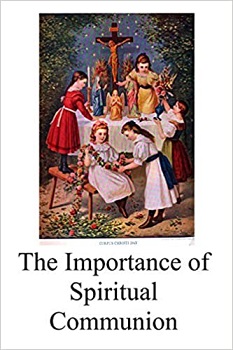
The Importance of Spiritual Communion
Kindle $2.99 / Paperback $5.99
If we cannot receive Holy Communion actually, then let us do so spiritually. These prayers and instructions have been gathered from the Saints and other venerated spiritual writers. Spiritual Communion has been a part of the spiritual life for decades. Growing up I was instructed to make a Spiritual Communion, when I could not go to Communion such as when I assisted at a second Mass. The same is true if one finds oneself at Mass, but not fasting. There are times coming, when it will be difficult, if not impossible to assist at the Holy Sacrifice of the Mass. We should be prepared for such times.
For More Good Traditional Catholic Books:

Sally's Super Summer Chicken BLT Salad

Ingredients
5 slices bacon
3 cups diced cooked chicken
1 cup chopped fresh tomato
2 stalks celery, thinly sliced
¾ cup mayonnaise
2 tablespoons minced green onion
1 tablespoon chopped parsley
1 teaspoon lemon juice
1 dash Worcestershire sauce
salt and ground black pepper to taste
12 leaves romaine lettuce
1 large avocado, sliced
Directions
1. Place bacon in a large skillet and cook over medium-high heat, turning occasionally, until evenly browned, about 10 minutes. Drain bacon slices on paper towels; crumble.
2. Stir chicken, bacon, tomato, and celery together in a bowl.
3. Whisk mayonnaise, parsley, green onions, lemon juice, Worcestershire sauce, salt, and black pepper together in a bowl until dressing is smooth. Pour dressing over chicken mixture; toss to coat. Refrigerate until chilled, at least 30 minutes.
4. Stir chicken mixture and serve over romaine lettuce leaves; garnish with avocado slices.
Mother Yoder's Scratch-Made Peach Cobbler
Ingredients
Peach Filling:
½ cup white sugar
1 tablespoon cornstarch
¼ teaspoon ground cinnamon
4 cups sliced fresh peaches
1 teaspoon lemon juice
Cobbler Topping:
1 cup all-purpose flour
1 tablespoon white sugar
1 ½ teaspoons baking powder
½ teaspoon salt
3 tablespoons shortening
½ cup milk
Directions
1. Preheat oven to 400 degrees F (200 degrees C).
2. Combine 1/2 cup sugar, cornstarch, and cinnamon in a saucepan and whisk to mix. Stir in sliced peaches and lemon juice, tossing until peaches are evenly coated.
3. Cook filling over medium heat, stirring constantly, until mixture thickens and boils. Boil 1 minute. Pour mixture into an ungreased 2-quart casserole dish. Keep mixture hot in oven while you make the topping.
4. In a medium bowl combine flour, 1 tablespoon sugar, baking powder, and salt. Mix thoroughly, then cut in shortening until mixture looks like fine crumbs. Add milk and stir until mixture is evenly moistened.
5. Remove peach filling from oven and drop dough onto peaches in 6 equal-size spoonfuls.
6. Return cobbler to oven and bake until topping is golden brown, 25 to 30 minutes.
Video sermons and instructions: Timeless timely truths for living the Faith
Seventh Sunday after Pentecost
Ninth Sunday after Pentecost
The Necessity of Mortification
The Man Who Fought the Devil - Chapter 1
True Stories Of First Communion #4 June 2018

Encouragement for Today
Therefore encourage one another and build one another up.... I Thessalonians 5:11
We believe that through our assorted podcasts, Vlogs, audio downloads and devotional blogs, you will find an assorted Treasure Chest of...
- Sermons
- Classic Catholic Audio Books.
- Devotionals
- Scripture Studies
- Catechism Lessons
- Old-Time Christian radio programs
- Catholic Videos
...that will be a help in your faithful walk with the Lord.
LEARN MORE AT THE ENCOURAGEMENT FOR TODAY WEBSITE: https://www.encouragementfortoday.com
Worried About Antarctic Ice
“And when I shall cover the sky with clouds, my bow shall appear in the clouds: And I will remember my covenant with you, and with every living soul that beareth flesh: and there shall no more be waters of a flood to destroy all flesh. ” Genesis 9:14-15

One visit on my bucket list, which I will probably not achieve, is a visit to the South Pole. The excitement of being on the underside of the world would be fascinating – though I imagine that one tires of the scenery quite quickly.
Antarctica is arguably the world’s oddest continent. Most of the land is covered by ice, which stretches out and covers the sea. So it looks white in every direction! Yet the ice hides a complex system of processes.
Climate Change alarmists show that they are still, really, wedded to the idea of anthropogenic global warming, as they issue scare stories about how the Antartctic’s ice cover could melt, causing the sea levels all over the world to rise by catastrophic amounts. Many of the world’s major cities are close to sea level, so the alarmists predict disaster, with the disappearance of places like London or New York. These scare stories appear to be backed up by the calving of new icebergs, as the ice sheet on the Western Peninsula breaks up.
However, the Western ice sheet has been breaking up for much longer than the alleged industrial increase in CO2. Worse still, for the alarmists – but better for the world – is the fact that the Eastern ice sheet has been growing steadily, gaining more ice than the loss of ice in the west.
God has promised that He will never again flood the world. As Christians, we can trust His promises with great certainty.
Prayer: Thank You, Father, for all Your promises to us. You are holy and never break Your word. Amen.
Catechism Catch-Up
Thy Will Be Done
Man's greatest honor and privilege is to do the will of God. This was what the Lord Jesus taught His disciples. He once said that only those who did His Father's will would enter the kingdom of Heaven (Matthew 7:21). He also said that His true brothers and sisters were those who did the will of God (Matthew 12:50).
This emphasis was duly passed on by the apostles to their generation. Saint Peter declared that God sets men free from sin so that they can do His will (1 Peter 4:1-2). Saint Paul asserted that believers are created anew in Christ Jesus so that they can walk in a path God has already mapped out for them. He therefore exhorted the Ephesian Christians not to be foolish, but to understand what the will of the Lord was for their lives (Ephesians 2:10; 5:17). He prayed for the Colossian Christians that they might be filled with the knowledge of God's will. He told them that his co-worker Epaphras was also praying for them that they might fulfill all the will of God (Colossians 1:9; 4:12). The apostle John taught that only those who did the will of God would abide forever (1 John 2:17).
This emphasis is unfortunately rare in our day and generation. Hence the shallowness and powerlessness of the average Christian today. Men are urged to come to Jesus merely to receive forgiveness. In apostolic times, people were told that forgiveness of sins was to be only a prelude to a life dedicated to the fulfillment of the whole will of God.
Acts 13:22 seems to imply that David was called "a man according to my own heart" because he desired to do the will of God alone. David himself tells us elsewhere that he delighted in doing God's will (Psalms 40:8). He was not a perfect man. He committed many sins, some very serious ones, for which God had to punish him severely. Yet God forgave him and found pleasure in him because basically David wanted to do all of God's will. This encourages us to believe that in spite of all our imperfections, we too can be men and women after God's own heart - if only our hearts are set on doing His will.
The New Testament urges believers to walk as Jesus walked, following His example. The guiding principle of Jesus' entire life and ministry was to do the will of His Father. He never moved until His Father told Him to. And when He did move, neither the threats of His enemies nor the pleadings of His friends could stop Him from doing what His Father required of Him. His daily food was to fulfill His Father's will (John 4:34). As men crave for food to nourish their bodies, He craved to do the will of the One Who had sent Him.
Every believer should have a similar hunger to fulfill all the will of God. How easy it is to pray, "Thy will be done on earth as it is in Heaven," and then to do just as we please, without seeking God's guidance in our daily lives.
READ MORE FROM THE TRADITIONAL CATECHISM AT THE WEBSITE: https://www.traditionalcatechism.com
Living Catholic:
Key Purpose for Spiritual Gifts

God has given us spiritual gifts for many purposes. Ultimately, all of these gifts have been provided to equip us to glorify God.
The gifts of the Spirit were given “For the perfecting of the saints, for the work of the ministry, for the edifying of the body of Christ: Until we all meet into the unity of faith, and of the knowledge of the Son of God, unto a perfect man [complete, mature] man, unto the measure of the age of the fulness of Christ. . . speaking the truth in charity, [that we] in all things grow up in him who is the head, even Christ:” (Ephesians 4:12–13, 15).
To Manifest God’s Presence in the Body of Christ on Earth
Jesus is our perfect example; He exemplified all the spiritual gifts through the words He spoke and the actions He carried out. Since Jesus is now at the right hand of God the Father, the Holy Spirit is the primary manifestation of the presence of God on the earth. Thus our heavenly Father distributes the gifts of the Spirit among the members of His Body, so believers now glorify God through those gifts.
Since the Holy Spirit is the one who shows or manifests God’s presence in the world, it is not surprising that Paul can call spiritual gifts ‘manifestations’ of the Holy Spirit (I Corinthians 12:7). When spiritual gifts are active, it is another indication of the presence of God the Holy Spirit in the Church.
One of the Spirit’s primary purposes in the new covenant age is to manifest the presence of God, to give indications that make the presence of God known. And when the Holy Spirit works in various ways that can be perceived by believers and unbelievers, this encourages people’s faith that God is near and that he is working to fulfill his purposes in the church and to bring blessing to his people.
Remind Us of Our Dependence Upon One Another
Rather than giving each believer all of the gifts, the Lord chose to give each of His children one motivational gift and an unlimited number of ministry and manifestation gifts. He did this so that no one would “think of himself more highly than he ought to think; but to think soberly, and according as God hath divided to every one the measure of faith. For as in one body we have many members, but all the members have not the same office: So we being many, are one body in Christ, and every one members one of another. And having different gifts, according to the grace that is given us, either prophecy, to be used according to the rule of faith; Or ministry, [serving] in ministering; or he that teacheth, in doctrine; He that exhorteth, in exhorting; he that giveth, with simplicity; he that ruleth, with carefulness; he that sheweth mercy, with cheerfulness."(Romans 12:3–8).
As our understanding of the spiritual gifts matures, our appreciation for all the members of the Body is magnified. For example, if you have the motivational gift of mercy, God has given you a heightened sensitivity to the hurts of others (so that He might express His compassion to them through you). Until you understand that everyone else is not supposed to be as sensitive to others’ hurts (to the degree that you discern them and want to respond to them), you will probably be tempted to condemn others as callous and heartless.
Our human nature, which naturally operates pridefully, assumes that “my perspective” is always the right perspective—and usually the “only” perspective. If you think that way, you are deceiving yourself. Yes, your perspective is valid—and essential—but it is not the only right perspective.
If others seem insensitive to someone’s hurts, it’s probably because God has not given them a spiritual gift that includes the “mercy-giver’s” heightened sensitivity to others’ suffering. Others are not being callous; they simply do not “see” as you see. In fact, others will be sensitive to needs to which you are totally oblivious, such as (1) the suffering person’s financial needs or (2) the need to be shown the truth about the situation that is causing the suffering or (3) the need to mow the sufferer’s overgrown lawn, which is frustrating his wife and his neighbors!
In this scenario, the giver would be quick to discern the financial needs, because God has given the giver a heightened sensitivity to them. The prophet, exhorter, and teacher would be especially sensitive to the need to point out God’s commands, promises, and precepts to the suffering person, so that he might obey God, be encouraged, and know the truth (which can set him free from bondage, i.e. types of suffering to which the mercy-giver is not as sensitive). The server would be quick to notice and address practical needs around the hospitalized person’s house, like an overgrown lawn. As different members of the Body of Christ discern each of these areas of need, all of the suffering person’s needs can be addressed and God will be glorified.
We need each other desperately. God has not given “the whole picture” to any individual, but He has given each of us a “window” through which we are to perceive one another’s needs—by using our spiritual gifts. All the needs cannot be met unless the Body of Christ is thriving, practicing our gifts in love.
To Build Unity in the Church
Spiritual gifts are given to the Church to unite it, not to divide it. (See John 17:21–22.) In his letter to the Ephesians, the Apostle Paul exhorts believers to endeavor “to keep the unity of the Spirit in the bond of peace.” (Ephesians 4:3), and he explains that God gave the ministry gifts (apostles, prophets, evangelists, pastors, and teachers) “for the perfecting of the saints . . . until we all meet into the unity of faith” (Ephesians 4:12–13).
We might think that people who have differing gifts would not readily get along well with each other, but Paul’s conclusion is just the opposite: differing gifts draw us together, because we are forced to depend on each other. "If the whole body were the eye, where would be the hearing? If the whole were hearing, where would be the smelling?” (I Corinthians 12:17).
These differing gifts, Paul tells us, are empowered by “But all these things one and the same Spirit worketh, dividing to every one according as he will.” (I Corinthians 12:11), so that in the church, “But the manifestation of the Spirit is given to every man to profit withal.” (I Corinthians 12:7). In fact, “in one Spirit we were all baptized into one body—Jews or Greeks, slaves or free—and all were made to drink of one Spirit”.
The idea that the Holy Spirit unifies the church is also evident in the fact that “Idolatry, witchcrafts, enmities, contentions, emulations, wraths, quarrels, dissensions, sects,” (Galatians 5:20) are desires of the flesh that are opposed to being “led by the Spirit” (Galatians 5:18, cf. v. 25). The Holy Spirit is the one who produces love in our hearts (Romans 5:5; Galatians 5:22; Colossians 1:8), and this love "is the bond of perfection”, it binds us everything in perfect harmony. (Colossians 3:14). Therefore when the Holy Spirit is working strongly in the Church to manifest God’s presence, one evidence will be a beautiful harmony and an overflowing love for one another.
To Edify the Church—Individually and Corporately
God gives us spiritual gifts for the edification of the Church (I Corinthians 14:12), to build up the Body of Christ in love and unity, “ that in all things God may be honoured through Jesus Christ” (I Peter 4:11). As God distributes His gifts among His people, His power, love, and wisdom are displayed gloriously and the Body of Christ is edified. “The manifestation of the Spirit is given to every man to profit withal” (I Corinthians 12:7).
The Apostle Paul exhorted the Corinthian believers, clearly identifying edification of the Church as the main purpose for the manifestation of the gifts: “Forasmuch as you are zealous of spirits, seek to abound unto the edifying of the church.” (I Corinthians 14:12; see also I Corinthians 14:3, 26, and Ephesians 4:10–16).
The spiritual gifts (motivational, ministry, and manifestation gifts) are God’s provision to equip His children to minister to others in ways beyond mere human capability and ingenuity. It is a manifestation of the Divine Presence when an ordinary human suddenly is given illumination of unknown facts and wisdom how to meet a difficult problem, or can discern what is an evil spirit, or can believe for a miracle, or can administer healing to an incurable, or can speak forth a message from the Lord in his own language or in one he has never learned, or interpret an utterance given in an unknown language. (See I Corinthians 12:7–11.)
The gifts of the Spirit are never an end in themselves. They are tools with which we can articulate the love of God to all men. They are not mysterious powers that can be bought or sold (see Acts 8:9–24); the gifts are bestowed upon God’s children by their Father, at His discretion and for His glory. “But all these things (gifts) one and the same Spirit worketh, dividing to every one according as he will.” (I Corinthians 12:11).
To Reveal the Living God to Unbelievers
The Spirit of God works through the spiritual gifts in ways that can be perceived by both believers and unbelievers. Believers are encouraged through the manifestation of the spiritual gifts because they are reminded that God truly is near and is actively, diligently, carefully, and thoroughly carrying out His will in the earth. Unbelievers come face to face with the reality of the living God as He displays His power, His love, and His wisdom through His people. (See I Corinthians 14:1–40.)
In his letter to the Corinthian church, the Apostle Paul explained one way that the spiritual gifts of tongues, interpretation of tongues, and prophecy can be manifested as tools of evangelism: “Wherefore tongues are for a sign, not to believers, but to unbelievers; but prophecies not to unbelievers, but to believers. If therefore the whole church come together into one place, and all speak with tongues, and there come in unlearned persons or infidels, will they not say that you are mad? But if all prophesy, and there come in one that believeth not, or an unlearned person, he is convinced of all, he is judged of all. The secrets of his heart are made manifest; and so, falling down on his face, he will adore God, affirming that God is among you indeed.” (I Corinthians 14:22–25).
To Bring Glory to God
God has given gifts to the Body of Christ to manifest His presence among us, to remind us of our dependence upon one another and thus build unity in the Church, to edify the Church individually and corporately, and to reach the lost. Through the spiritual gifts (motivational gifts, manifestation gifts, and ministry gifts), the believer is humbled, fulfilled, encouraged, and made useful in the hands of our Master, to whom all glory is due.
To Learn More Principles For Life Go To: Resources: Principles of Life


Pray for the Holy Father! Pray with the Holy Father!
- Your prayers are asked this month and every month for the intentions of the Holy Father, Pope Michael.
- Pray for the Holy Father in the preparation for the tenth anniversary of His Holiness' Coronation on Friday, December 10, 2021.
- Your prayers and support are asked in a special way for the soon to be established House of Prayer.
- Pray especially that the Holy Ghost inspires and helps us prepare spiritual manuals and days of recollection to make available to all.
- Keep in your prayers our Podcast Ministry, a new way to reach out in the missionary work of the Church! We ask for prayers for our other activities world wide. We have made good contacts in the Philippines and Japan and ask prayers that these contacts will bear much fruit for the salvation of souls.
- Be sure to keep St. Helen Catholic Mission in your prayers. Why not go on over to the site now and see what they have to offer and how you might be able to help!
- Also we ask you to keep in prayer our increasing missionary work in the United States and elsewhere.
- Pray for those outside the Church and those who do not know God, that they may see the light of grace and be led safely home to the refuge of the Holy Catholic Church.
- As always, we also ask that you pray for yourself! Never forget your own state of soul. God is calling you to His service in His love. We know that our Lord can count on you to answer.
- We are all praying especially for you, too. May you correspond with every grace of God!
- In what other needs or intentions may we pray for you? Let us know!
- Let us remember that the Church runs on prayer. Without your prayers, God will not work in hearts and souls to bring them to a knowledge of the truth. (I Timothy 2:4)


To Donate online go to:

To Donate by Mail:
Our address is
Vatican in Exile
829 NE Chester
Topeka, Kansas 66616
Make Checks payable to:
Vatican in Exile


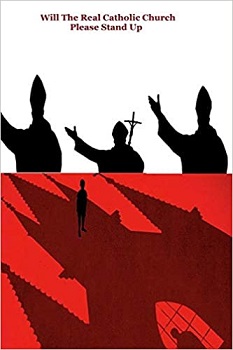










 Follow
Follow


